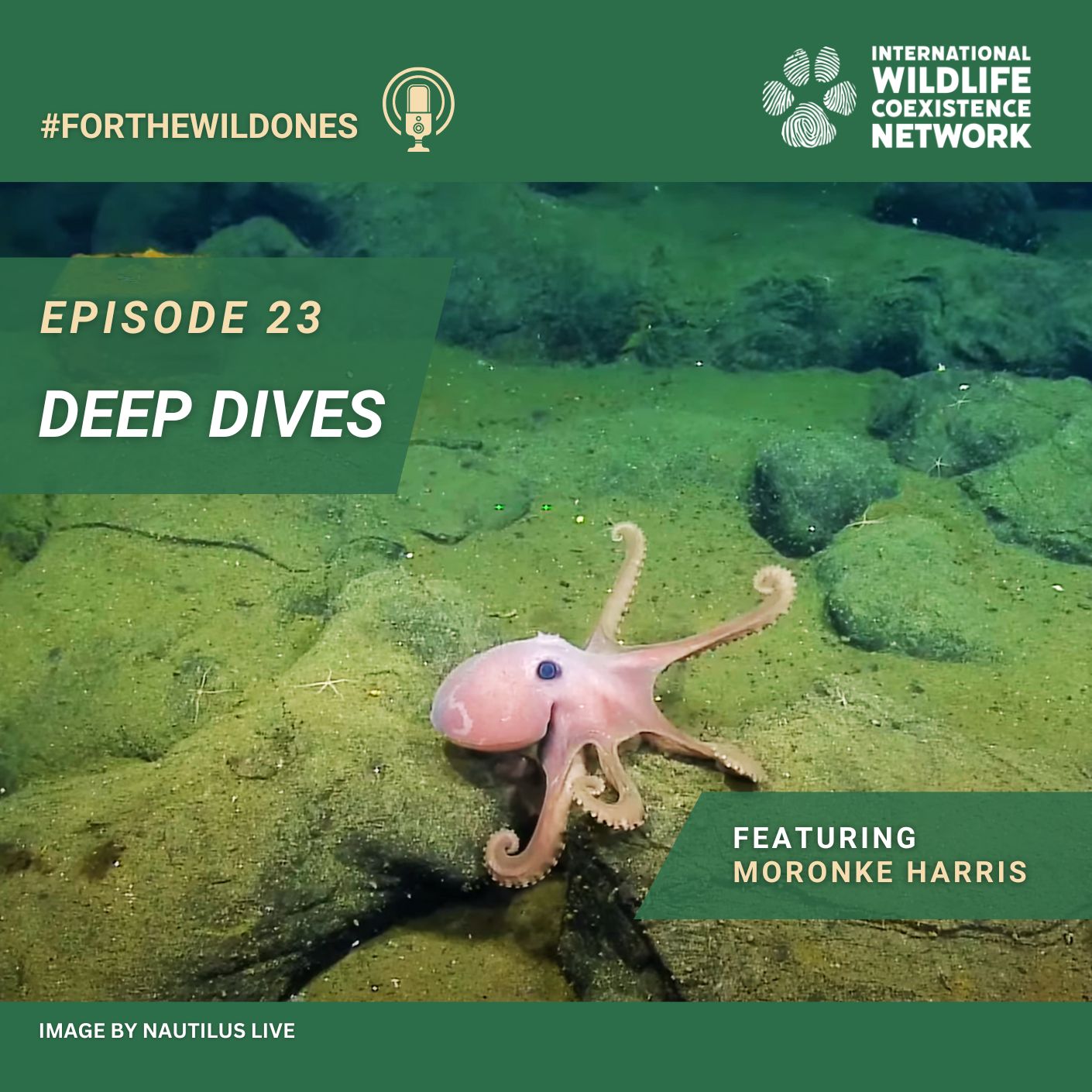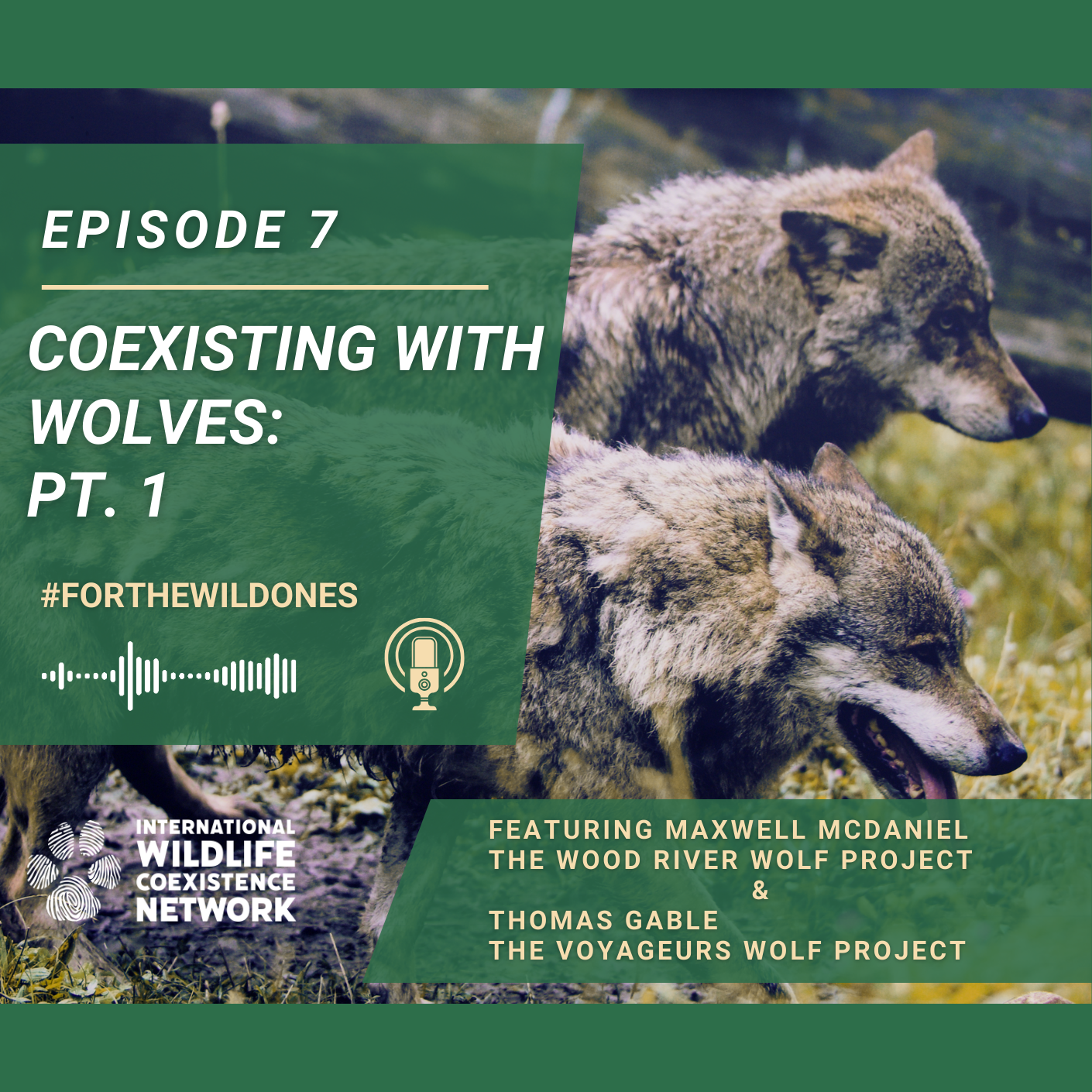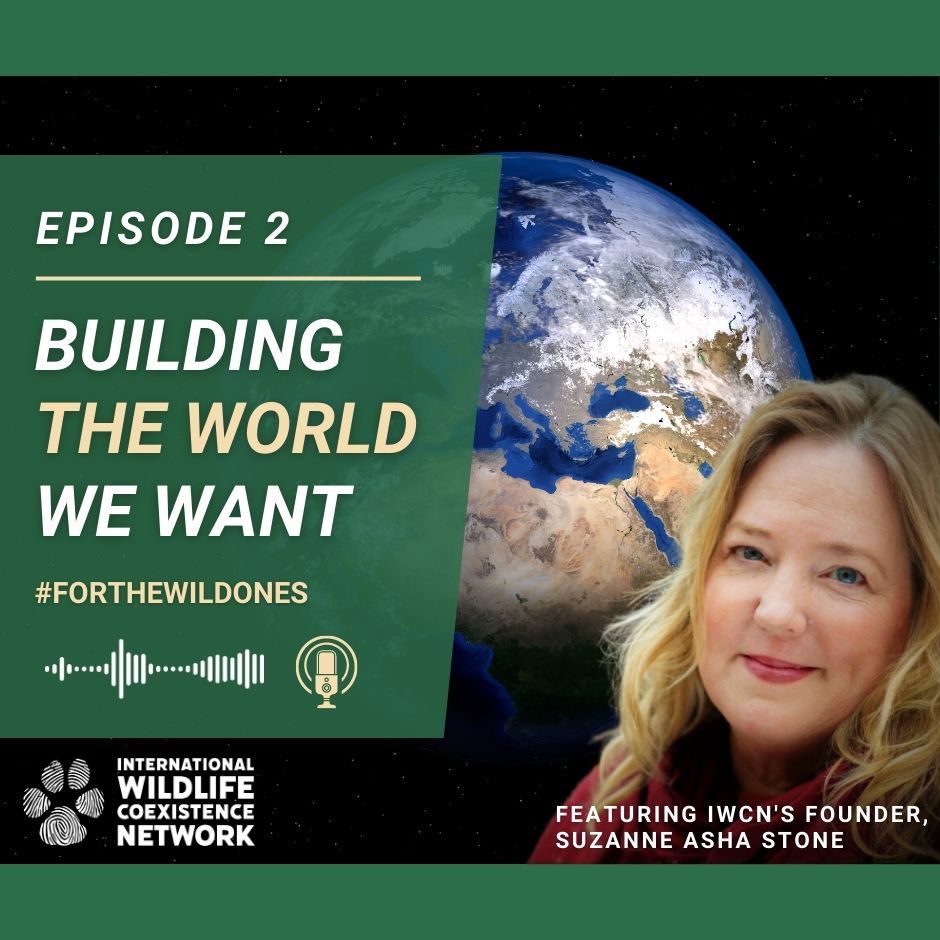Episode Transcript
[00:00:00] Speaker A: The International Wildlife Coexistence Network is a fervent advocate for wildlife, including iconic species like bison, bear, and wolves. I'm Josh Adler, and on this episode of for the Wild Ones, we're turning to IWCN's leadership to speak truth into crucial wildlife conservation topics in the states, new signs of harmony, the essential nature of our public lands, and the urgent need for new legislation to protect some of our most persecuted four legged relatives. What role can humanity play in creating lasting coexistence with our living world?
[00:01:06] Speaker B: I'm Dallas Gudjil, wildlife and tribal policy director for International Wildlife Coexistence Network.
[00:01:14] Speaker C: I'm Suzanne Aisha Stone, and I'm the director for IWCN, the International Wildlife Coexistence Network. And I'm a wolf girl.
[00:01:23] Speaker B: We're starting blogs a little bit about what's going on in the world of wildlife conservation.
It is one month after the naming ceremony for the white buffalo calf that was born in Yellowstone National park. On June 4, we had the opportunity to attend that, which was amazing. I'm Yankton, Dakota, from Fort Peck. Cinnaboine ensued reservation in northeastern Montana, and our spiritual leader, Orval looking horse, named the buffalo wakangli, which means return sacred. And it's a complex name which translates to return sacred. And it is the fulfillment of a prophecy of the Lakota people of white buffalo calf woman, a prophecy that's thousands of years old. So it's the culmination of that, a blessing and a warning. When the white buffalo calf puts its feet on the ground with black nose, black eyes, and black hooves, the blessing is that we are children of mother earth, and it's our responsibility to live in right relationship with the natural world. The warning is that perhaps if we look around over the last few years, with climate warming, with the loss of biodiversity, maybe we're not doing well in our living in right relationship with the natural world and the earth. And so that's that naming that orbal presented with many tribes present and a lot of folks in the audience, we had 550 people in attendance, was very moving, very meaningful. There was plenty of tears in the audience to commemorate this naming of the white buffalo calf. So Wakangli has shown herself. She's out there, and so we are. We're charged with this new paradigm, perhaps the turning point, as arable puts it, a turning point for the two legged to straighten up and change our ways and get back into right relationship with the natural world, with one another, with our four legged relatives. So that creates this new energy as Orbal says, we'd like to put our minds and hearts together, mostly our hearts, to change the energy. And that's entirely possible. We've seen a few things in the last 30 days that have already changed the energy. Hope is a big word, but in my world, a little bit more possibility for things to change and for things to change for our four legged relatives, which is who we're talking about today.
[00:04:06] Speaker C: Yeah, I can't quit smiling. I mean, I think since Sunday especially, that there is a new path that opened up for us. And how this affects all things is yet to be seen, but it brings forward a new path for all the work that we're doing in wildlife and that the species that we focus on so often are the ones that are the most persecuted. And this opening is a way for us to try to find a new path to end that persecution and bring it back to right relationship in terms of coexisting with these species, having respect for them, understanding that they're playing a very important role in helping to sustain biodiversity on the landscape, and that they need our protection from those that don't understand that. And we finally have an opening, it seems, that gives us a path, that new path forward and an opportunity to create the world we want. That's quite a gift.
[00:05:06] Speaker B: Yeah. We began doing this work both together and separately many decades ago.
[00:05:14] Speaker C: A long time ago.
[00:05:16] Speaker B: Twelve.
[00:05:17] Speaker C: Yeah, twelve.
[00:05:20] Speaker B: And here we are. We have this opportunity to make some meaningful changes. We've even been working on a piece of legislation for nearly three years, myself for a year and a half plus, and Suzanne for longer. That could really change what we're talking about, the persecution of some of the most persecuted species, grizzly bears, bison and wolves, the ones that seem to be, at least in the Rocky Mountain west, in a lot of state control. And the state control has proven to not be a friend to these species, not recognize them as relatives with intrinsic value all on their own, much less the value that they have as indicators of overall holistic, ecological and biological health. So this legislation is forthcoming, and we'll be able to talk about that more on other episodes. But it changes the landscape. And we've noticed the energy shift in the landscape's already changed in the last few weeks since this birth of the calf.
[00:06:28] Speaker C: And since then, we're going to. We've decided we're going to Washington, DC. Right. We're going to be there on September 22 and 23rd with a big rally on the 22nd.
[00:06:40] Speaker B: Yeah. So on the 22nd, which is a Sunday, we will be in a park, likely the park adjacent to the Native American Museum. We're hoping to have 1000 plus people there, 2000 supporting indigenous leaders from around the nation. We're having probably eight to a dozen tribal speakers that are going to talk about their historical and cultural relationship with grizzly bears, bison and wolves. How those life ways of living in relationship with our four legged relatives is important not only for that relationship that we have with these four legged relatives, but recognizing them as an integral piece of the puzzle of biodiversity and recognizing them also with the respect that we have for them. We have agreements with some of the four leggeds, like the bison, that have offered to give up their bodies to nourish us. And so we have tribes that will be there presenting, that will talk about their buffalo lifeways. And it'll be an all day event. And we plan to do some visits on the hill and in the administration, but we can stay tuned for that. The big fun thing will be on the 22nd and we'll have youth leaders.
[00:08:00] Speaker C: There as well, because the world that we're creating is really about them and those future generations hopefully being inspired by what is possible to do in terms of changing this world in the direction we're going now. Obviously, our Earth is sick and is experiencing that and telling us about that in the ways that are affirmed almost every day. Sunday, I understand, was the hottest day recorded on planet Earth since they started recording. It is a wake up call, really, for all of us. This is our planet. Each one of us has a role to play. It doesn't matter how small that is or how big it is, it's every person's involvement is important. This is not time to be a spectator. This is time to be involved. So we look forward to you coming to DC. If you can join us there. And if you want to help support us, feel free to also make a donation. And you can help support getting the youth leaders there and the tribal leaders there and making this a very successful event.
[00:08:58] Speaker B: I hope you all come. Yeah. I think it's no secret that the earth and our four legged relatives and our rooted relatives, our winged relatives have been trying to talk to us. And many of the indigenous creation stories around the world. Doesn't matter what continent we were able to talk to our four legged relatives, our relatives with roots and wings and fins. And somehow I think we aren't tuned into that conversation as much anymore. And we learn from the bison, we learn from the grizzly bear, the healing spirit of the grizzly bear. We learn from the wolf, we learn how to be in relationship, in family and community from the wolves. We learn how to be in community from the buffalo. So it's time to listen. That's what this new vibe, this new energy is about. And we hope to see you in DC on September 22.
[00:09:52] Speaker C: Hey, it's Suzanne Stone. I am director of the International Wildlife Coexistence Network. And next to me is Dallas Gudgel.
[00:10:00] Speaker B: I am the wildlife and tribal policy director for International Wildlife Coexistence Network.
[00:10:06] Speaker C: And we are still talking about the rally in Washington, DC on September 22. We're going to be there during the day outside at one of the parks in DC. So more details to come on that. Then the next day, we were planning to stay and go visit folks on the hill and talk to them about new legislation that's going to be coming out that day, we think, and it will be focused on bison, grizzly, wolves, three of our favorite species. And why did we choose bison, grizzly and wolves?
[00:10:39] Speaker B: Well, these are keystone species. There's a lot. It doesn't have to be a charismatic megafauna to be a keystone species, but we are selecting bison, grizzly bears and wolves as indicators of ecological health, bioregional health, and in this time of great loss of biodiversity in species in general.
These are three species that we can take a look at and watch, learn from, and understand their natural nature and their natural part of the natural world. So as apex predators, grizzly bears and wolves really do have a cascading effect on their environment, their ecosystems. And bison, having been 30 to 60 million of them across North America as a keystone species, really have a very, very substantial effect on the ecosystem, especially arid grasslands in North America. So these keystone species can really help to restore natural habitat, natural world bison in particular.
Part of the reason that their relationship with where they lived was so important is because they could migrate, and that's why the arid grasslands were so healthy. And we read about those grasslands that were 4ft tall, 6ft tall grasses, and they're all, they've gone away. So picking these three species as indicators of biological health seems like one of the best things to talk about.
The other piece of it is the wild bison herd in the park is kind of confined to their reservation.
All three of these species were persecuted, and bison in particular, persecuted and killed to near extinction and persecuted, just like native american tribes were across the west, across the whole continent.
And then I'm from Fort Peck. My reservation is in northeastern Montana. We native folks were put on reservations, and my four legged relatives, the bison, were confined to their park. That is not a holistic way to manage bison.
There's 8 million acres outside of the 2 million acres of the park, and they need to be roaming free on all 10 million acres of that public land ecosystem.
[00:13:23] Speaker C: Yeah. And all of these species are dependent on our public lands. Right? So these public lands are supposed to be federally managed, but the wildlife that are on them, that management has been turned over to the states.
And what we're seeing in Idaho, Montana, Wyoming, is that the states are actually giving more protection to domestic, non native livestock than they are to these species that are indigenous to these public lands and also keystone species, essential to the protection of biodiversity, health on those lands. And each year, it seems like it becomes worse for these species. Wolves lost their federal protection here in 2010. Since that time, the wolf population has dropped at least by half with intense persecution. They're being killed 365 days of the year. There's no protection for them. People can kill as many as they want to, and they're even going as far as putting bounties again on wolves, so that for thousands of dollars each, people are digging up den sites, pulling pups out of dens, stomping them to death, and then turning them in for bounties of thousands of dollars. And wolves simply just cannot sustain that. We saw what happened a century ago, right, when we lost the wolves initially from this region, because people were persecuting them. So in the same manner that they're doing it today. So we know that it is such an intense pressure on this population of wolves that even though we celebrated bringing wolves back to Yellowstone and Idaho and Montana in the late 1990s, we could see the complete demise of that population again. And it's certainly on its last legs now. So if we're going to step in, it needs to be from the federal perspective, so that the states aren't allowed to just eradicate their wolf populations.
[00:15:21] Speaker B: Yeah.
When we talk about grizzly bears and bison, currently, grizzly bears have some federal protections now that is imminently, potentially going away. Those federal protections and what will happen is that management of that species then will be turned back over to the states. And from what I've seen from state management of wolves and bison, there isn't a scientific basis for the persecution of wolves and bison by the state management agencies. I would argue that there's no moral ground for treating bison and wolves the way they've been treated as an integral and intrinsic part of the natural world in the Rocky Mountain states. And so grizzly bears need that federal protection. They need the states to not be in the management industry or grizzly bears. Same with bison. They're managed in the state of Montana as livestock. Well, this is a wild species, and they should be managed as wildlife and not persecuted. And once they cross out of Yellowstone National park into Montana, they are persecuted, they're captured for slaughter, they're hazed. All of these things, they should be allowed to walk out into our national public lands of the Forest Service. Unpersecuted. They have one place of safe harbor currently, which is on horse Butte near Hepgen Lake on the west side of the park. They need to be able to access and roam free on all 10 million acres of that greater Yellowstone ecosystem and without state management or persecution.
[00:17:12] Speaker C: So if you're going to come join us in September for the rally, I know we're going to howl for the wolves, probably do a little growling for the grizzly and maybe some bellowing for the bison.
We're going to have a great time and remind people that the public lands belong to us. The public and certainly the stewards of those lands should be the tribes that were there even before that. They know how to manage those relationships with the wildlife there in a way that maintains that abundance and the strength of that biodiversity. And that's failing around the world. We're seeing the greatest loss of biodiversity on this planet since humans have walked the earth.
We need to change that, and it's up to all of us to be part of that.
[00:18:01] Speaker B: Yeah. Come join us and make the change.
[00:18:07] Speaker A: And there you have it. Work in abundance. Summon your strength and let's make the change we all want to see in the world. Keep on the lookout for future episodes of Wolf talk with Suzanne and Dallas.
To join us in DC this September, go to bisongrizzlywolf.org. that's bisongrizzlywolf.org. dot.
We sincerely hope this episode of for the Wild Ones and all our episodes are making your world just a little bit wilder.


